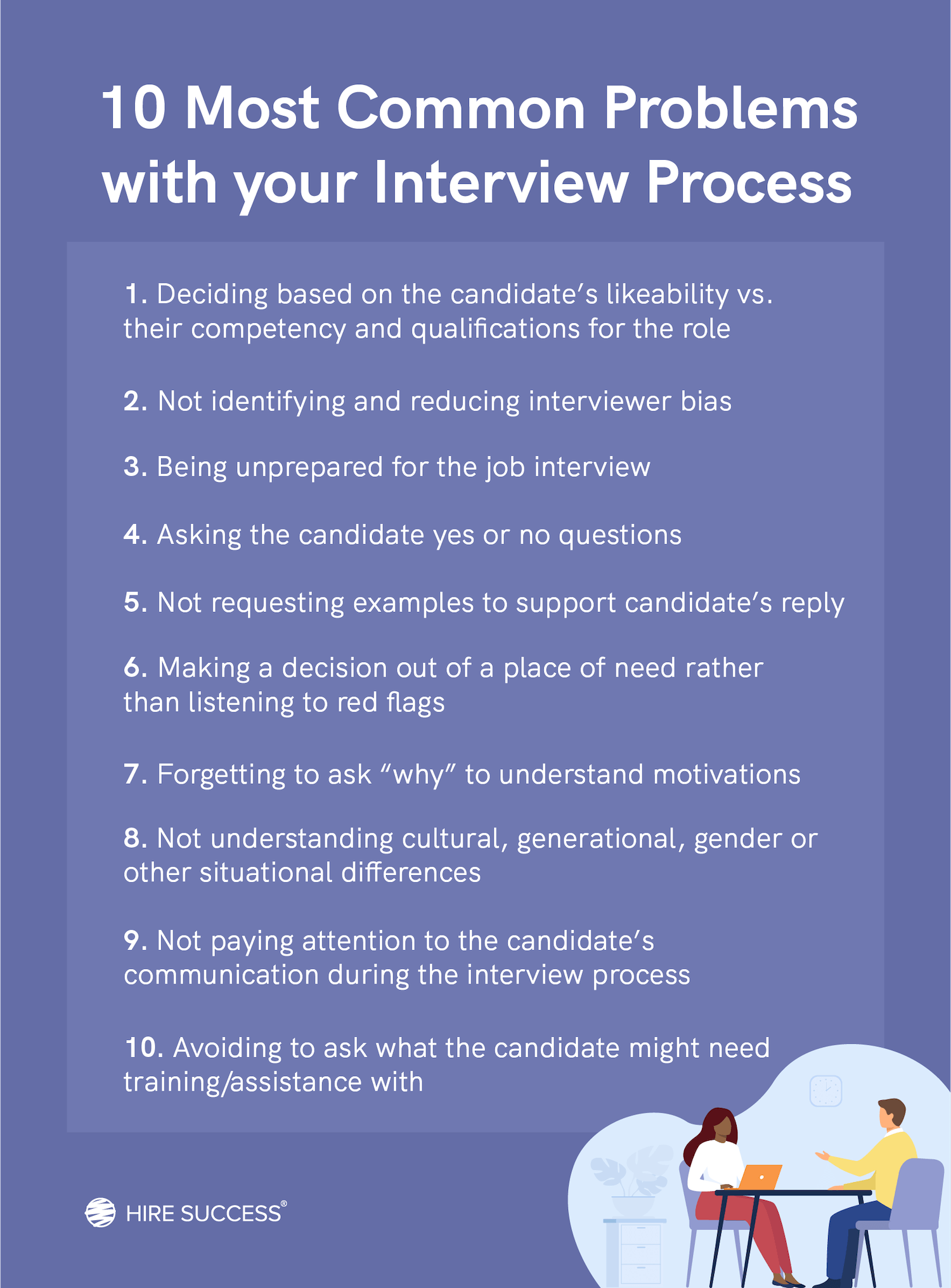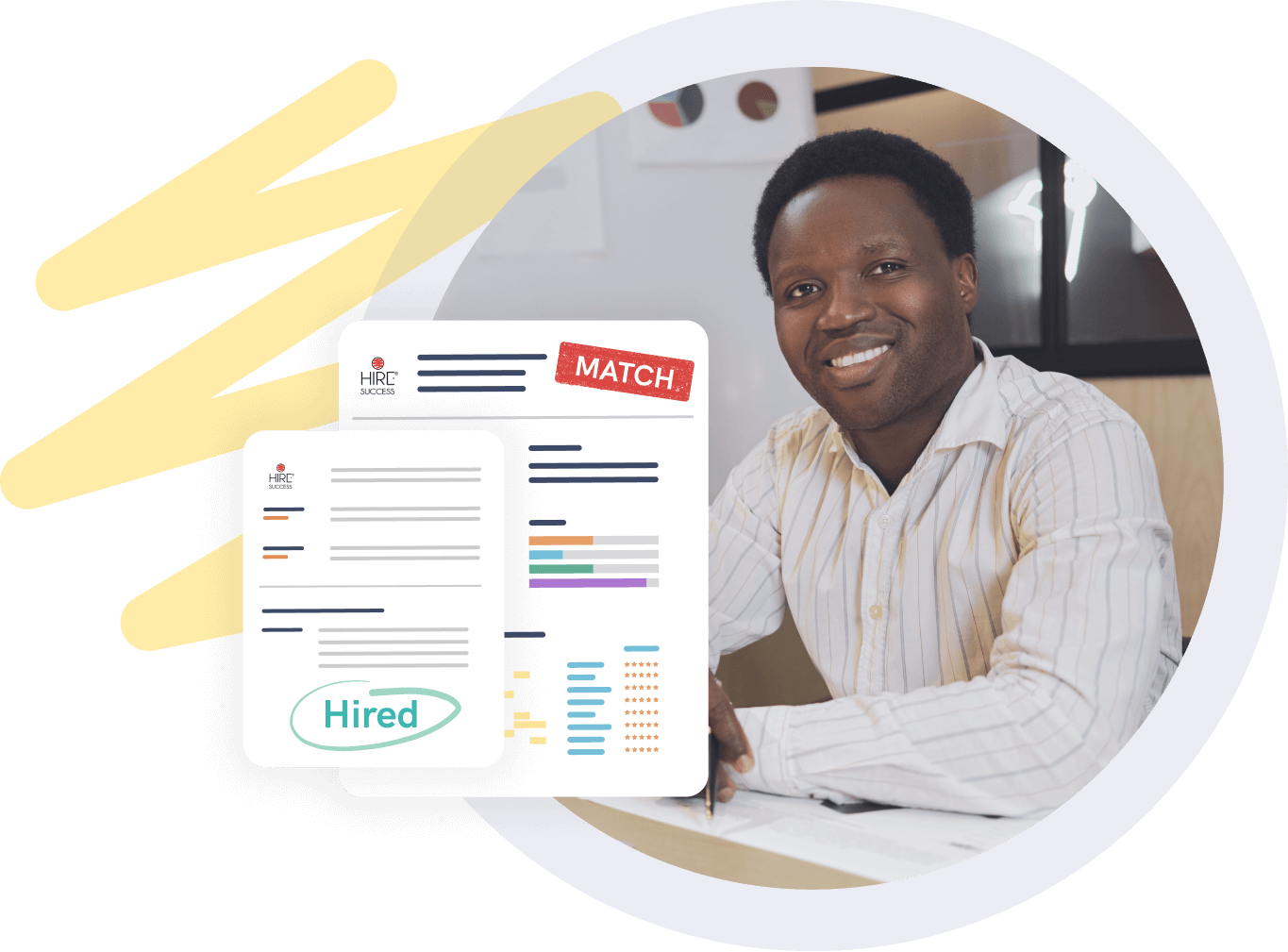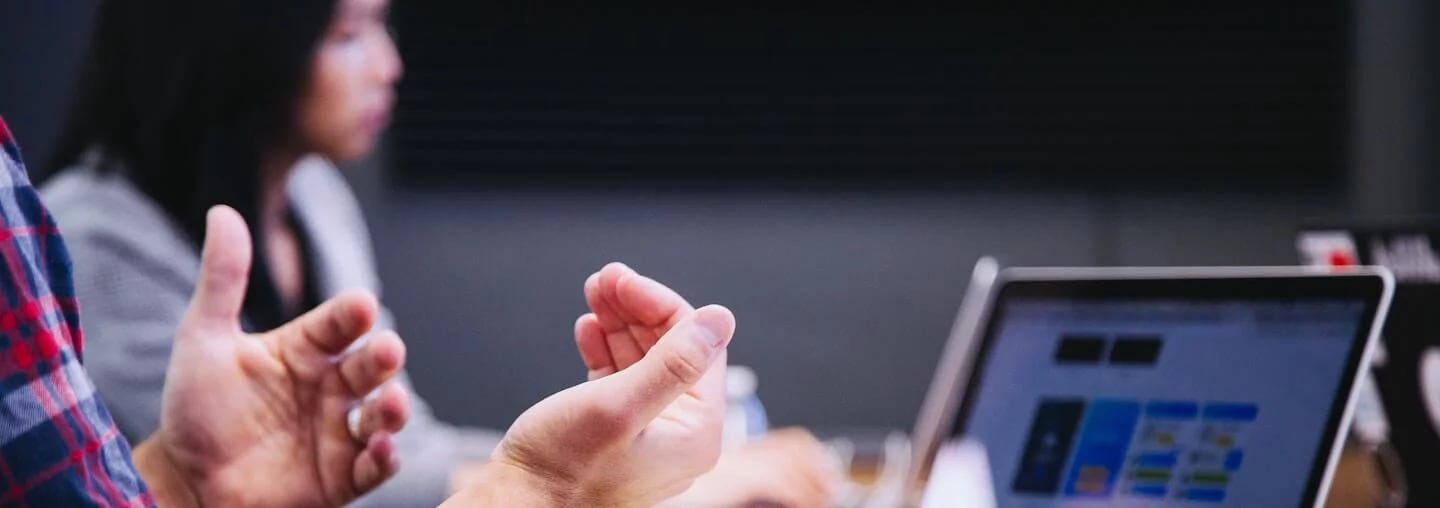Have you ever discovered that a person you hired to do a job – someone you felt you really “knew” after an extensive resume review and interview process – turned out to be totally different than what you expected?
If you find yourself with consistent bad hires, your interview process is likely to blame. It may be time to evaluate your interview method, make sure you're asking the right questions, and decide what kind of answers produce the most successful hires.
Let's take a look at common challenges with your job interviews (in person and remote) and discuss how to overcome them.
- Bad hires may indicate problems with your hiring and interview methods.
- Readily available resources such as sample interview questions and AI make interviews more challenging for employers.
- It's crucial to ask for real-life examples and give open-ended questions during interviews to get in-depth responses from candidates.
- Skills and personality testing can help you ask the right questions in your interviews.
Most common problems with interviewing candidates
One big problem in the hiring process today is all the information available on the Internet. If you search for common interview questions with sample answers, you'll find dozens of pages like this one from Columbia University. Informational resources like this are a great way to prepare for interviews and are used by HR professionals and job seekers alike - and that's the problem. Prospective hires know what you're going to ask and have already prepared answers using guidelines offered by experts.
Prepared candidates are not necessarily a bad thing, but are you only seeing the image they want to project? Memorized answers are only the tip of the bad hire iceberg. Job candidates interviewed remotely may also be able to use AI to get help forming answers. Other problems with the interview process include:
1. Deciding based on the candidate's likeability vs. their competency and qualifications for the role
As human beings, we have natural hiring biases. We like certain types of people and personalities. But hiring based solely on how well you get along with someone is not the best method of evaluating candidates. You need to know whether they have the core competency to be good at their jobs. The perfect candidate is not always the one you like best. However, evaluating personality as one aspect in the hiring process is a crucial part of getting the right hire. Your goal should be to match the personality to the needs of the position and your company (and not the interviewer's).
In its HR guide, Introduction to Competency-Based Hiring, the Department of Human Health and Services (HHS) defines core competencies as:
“An individual's core competencies are determined by two groups of factors: (1) skills, knowledge, and technical qualifications and (2) behavioral characteristics, personality attributes, and individual aptitudes.”
Your goal as an interviewer is to put aside whether you'd like to be friends with a candidate and assess the core competencies of potential employees and find the candidates with the talents you can train into valuable skills.
Say goodbye to guesswork, hire with confidence
Try our platform for free and get unbiased, data-driven insights into candidates' personal qualities and abilities.
Book a demo Try it free2. Not identifying and reducing interview bias
In addition to avoiding the likeability trap, you need to be aware of -and overcome- interviewer bias. How can you know if you're biased?
In an HBR article, Iris Bohnet, director of the Women and Public Policy Program at the Harvard Kennedy School, and the author of What Works: Gender Equality by Design explained how hiring bias works. “Seeing is believing,” she said. “If we don't see male kindergarten teachers or female engineers, we don't naturally associate men and women with those jobs, and we apply different standards” when hiring, promoting, and evaluating job performance. “Managers have to learn to de-bias their practices and procedures.”
It's impossible to remove personal bias from an interviewer, but it is possible to design and structure an interview process that eliminates bias.
3. Being unprepared for the job interview
When a job seeker shows up at an interview, your office may not be their last stop of the day. It's important to respect their time and keep to the schedule, even if it means seeing fewer people each day.
Job interviews are already nerve-wracking, and being ignored long past the interview time can erode confidence and rob both you and your prospect of a good interview. And if you happen to keep top talent waiting, basic lack of courtesy could easily be a tipping point between you and your competition.
4. Asking the candidate yes or no questions
Interview questions with a yes or no answer provide no insight into the candidate's character or thought process. Open-ended questions challenge applicants to be creative and thoughtful. Their responses can shed light on problem-solving abilities, perceived strengths and weaknesses, core beliefs, and even integrity.
5. Not requesting examples to support candidate's reply
Follow-up questions provide additional insight. Remember, candidates have a huge range of typical questions and answers they can use to prepare - and to tell you exactly what you want to hear.
By asking them to provide an example or story that supports their answer, you can often determine whether it's a concept they understand or a bullet point they memorized without context. If they can provide a personal story about a similar situation, it adds credibility to their experience.

6. Making a decision out of a place of need rather than listening to red flags
Every hiring manager gets in a bind now and then. They need people now. It's a lot easier to relax standards when you are desperate for workers and the hiring pool is limited. Hiring the wrong person is often more expensive in the long run than not hiring at all, so be mindful of red flags during interviews. Any concerns you might have during the interview process will likely be amplified later.
7. Forgetting to ask “why” to understand motivations
Job histories may be spotty for any number of reasons that are not red flags. For example, people may take time off to have children, care for sick family members, recover from an injury, try to start their own business, or build their education to qualify for a better job. Before you write off a candidate based on job history, ask for details about any gaps in work history.
8. Not understanding cultural, generational, gender or other situational differences
Good communication skills are often difficult. You may encounter a candidate with autism, a stutter, or one for whom English is a second (or seventh language). Some job candidates will be from cultures with strict protocols about addressing superiors.
Keep in mind cultural differences that may include holidays, level of respect, and even sense of humor - the jokes you use to break the ice may confuse people from other cultures. Even when talking to people born in your hometown, you may find gender or generational differences.
Pay more attention to what people say than how they say it.
As a hiring manager, you know the value of diversity, equity and inclusion in the workplace. Make sure you don't overlook insanely talented people because they sound different than you expect.
Invest in future performance, predict long-term fit
Use our personality assessment to identify candidates who will thrive in their role and in your evolving organization.
Book a demo Try it free
9. Not paying attention to the candidate's communication during the interview process
Communication comes in all forms. Written, verbal, and body language. It's important to pay attention to what the candidate is saying as well as their body language cues, such as facial expressions or hand gestures. A growing number of job interviews are conducted remotely these days. It can be a real challenge to notice and read these signals with only a screen. Pay close attention as your candidate might attempt to use ChatGPT to get help with answering. In extreme cases, particularly in IT jobs, you may also deal with a stand-in performing the interview for someone else. Make sure the same person shows up on their first day on the job.
Note that the interview doesn't start when the candidate is sitting in front of you or when you talk to them remotely. In most cases, you've already begun to form an opinion based on their resume and social media, their response to your interview invitation, and any other opportunities you've had to observe. This should not end with the in-person or remote interview, either. Your evaluation should last through the onboarding and probationary periods to ensure the person you hire meets expectations.
10. Avoiding to ask what the candidate might need training/assistance with
Too many interviewers avoid asking awkward questions, but it's important to find out what tasks the job prospect might feel unqualified for. Honest answers show the candidate's humility, self-awareness, and willingness to learn. A good answer, for example, might be “I have never done [this task] before, but it is similar to other things I have done in the past, and I'm eager to learn new skills.”
Are job interviews flawed and outdated?
Hiring is an expensive, arduous process. No matter how much time and money you put in to identify, attract, and hire valuable employees, the process often breaks down, and hiring the wrong person can be costly. Unfortunately, hiring the wrong person often comes down to problems with the interview process.
So, if you're hiring, what does this mean? You can't just give up interviews altogether, can you?
Not really. Good interviews, whether remote or in person, give you the opportunity to learn a great deal about potential new hires. You can work on learning how to conduct better interviews. You can also add value to your interviews with pre-employment testing during the hiring process.
Using testing and baselines to improve your interview method
Testing can provide you with personality trait information and assessments of skills, which will help you hone your interview skills and prepare better, more focused, customized questions for each candidate.
Effective testing starts with a baseline to determine traits your most valuable hires have that weak performers lack. Establishing baselines helps create effective interview questions and personality tests specific to each open job position. The way job applicants answer can accurately predict future on-the-job performance.
But who has time for all that? Creating baselines and coming up with specific, effective questions for every job candidate is time-consuming. That's why Hire Success® does the work for you.
By gathering critical information during testing, analyzing data, then using the results to generate unique interview questions for each applicant, we give you the tools you need. Our comprehensive interviewer's guide helps you maximize your interviews, identify ideal candidates, and hire the right people.
With Hire Success®, you have an affordable, convenient, and simple method for conducting and documenting more meaningful, efficient interviews – and understanding traits and capabilities before you do – reducing the possibility of bad hires.
Want to eliminate your costly problems with your interview process? Contact us to schedule a free, no-obligation 30-minute consultation with one of our hiring experts.
Latest Stories
Here’s what we've been up to recently.

How to Create Skills-Based Assessments for Hiring
Companies are taking a closer look at the skills they need employees to have, and how to best assess those skills. Having a degree or certification in a certain area is not an accurate indicator of candidate capability. This new awareness has led to what Harvard Business Review calls a “reset in hiring practices.”
Kelly Cantwell

Why Hiring Takes So Long and How to Speed It Up
Talent shortages and increased competition made hiring difficult in a pandemic. Top candidates were often swept off the market quickly, meaning businesses who failed to act fast were left to hire from a smaller, less-qualified applicant pool.
Kelly Cantwell

Structured vs. Unstructured Interviews
There are two basic styles, or models, of interviews employers usually use when hiring new employees: structured and unstructured interviews. Just like job candidates, each one has its own strengths and weaknesses. But do the advantages of a structured interview outweigh the advantages of an unstructured interview?
Kelly Cantwell
Get our stories delivered
From us to your inbox weekly.